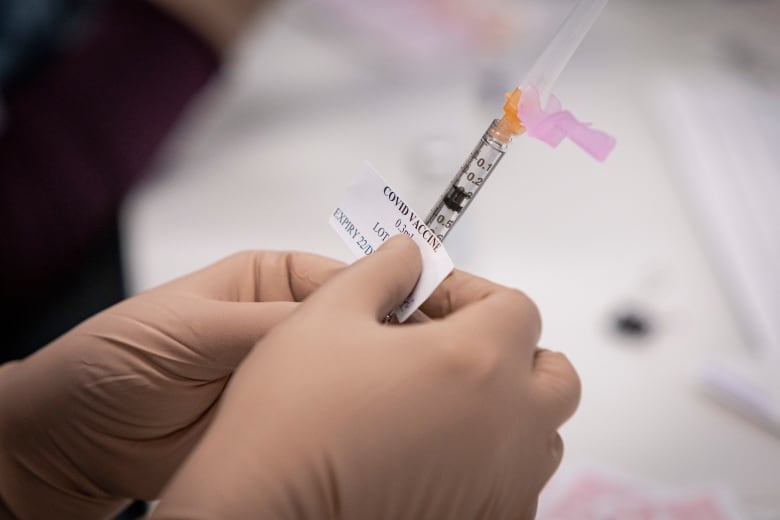Getting vaccinated to protect yourself from the virus behind COVID-19 isn't a one-and-done process in Canada right now.
The two approved options, from Pfizer-BioNTech and Moderna, both require a two-dose regimen, with each dose ideally spaced apart by a specific time interval that was used during clinical trials.
But that's not how every region is handling the vaccine roll-out. While Ontario is striving to hold back enough doses so people get both shots in the recommended time-frames, B.C. is delaying second doses by up to a week or two past manufacturers' guidelines, and Quebec is going even further, waiting up to three times longer.
The goal is to vaccinate as many people as quickly as possible, but there are still questions over just how effective these vaccines will be if policymakers stray too far from the guidelines.
What is the recommended dosing approach?
Official guidelines say the Pfizer-BioNTech vaccine is meant to be given as two doses, 21 days apart, while Moderna recommends spacing doses 28 days apart.
Canada's National Advisory Committee on Immunization, a federal body made up of scientists and vaccine experts, says every effort should be made to follow those dosing schedules.
But, since vaccine shipments are still trickling in, the panel offered some wiggle room — suggesting the second dose for either vaccine could be delayed up to six weeks at the most.
"The flexibility provided by a reasonable extension of the dose interval to 42 days where operationally necessary, combined with increasing predictability of vaccine supply, support our public health objective to protect high-risk groups as quickly as possible," reads a statement released Thursday from Dr. Theresa Tam, chief public health officer of Canada, and the country's provincial and territorial chief medical officers of health.

Why are two doses, at a specific interval, even necessary?
The official guidelines for dosing intervals are based on each manufacturer's clinical trial data, showing that the vaccines were most effective sometime after people got both rounds.
Vaccine efficacy for Pfizer-BioNTech's option was around 95 per cent after both doses; for Moderna's it was around 94 per cent following the second dose. (Certain high-risk groups weren't part of those clinical trials, however, including anyone pregnant or immunocompromised.)
While research suggests there may be some level of protection from even just one shot, the consensus in Canada is that following guidelines based on the clinical trial data — as closely as possible — is the best bet to ensure people are protected.
"We also do not know how long lasting the protection will be," said Dr. Howard Njoo, Canada's deputy chief public health officer, during a briefing on Thursday.
"We know it's better with two doses, but with one single dose, we are not sure."
WATCH | : Dr. Howard Njoo discusses spacing vaccine doses out 42 days:
So can you get sick from COVID-19 if you only get one dose?
Potentially, yes.
Clinical trials showed the level of protection from just one dose is lower for both vaccines, and it also takes time for your body to react — meaning you aren't protected immediately after getting a shot.
The highest level of efficacy reported for Pfizer-BioNTech's vaccine started a week after people got their second dose, and after at least two weeks following the second dose of the Moderna option.
In Quebec, health officials are currently examining how multiple residents of a long-term care home fell ill with COVID-19, despite being among the earliest in that province to receive a first round of the Pfizer-BioNTech vaccine.
That prompted questions over when the residents were infected, and Njoo noted the individuals may have already contracted the virus before getting vaccinated at all.
Long-term research will be helpful in confirming just how much protection people get from one dose of either of the approved two-dose vaccines, and how long it's safe to delay the second shot.

Why are different regions handling dosages differently?
Some provinces, such as Manitoba and Saskatchewan, are sticking with the dosing schedule set out by the vaccine manufacturers.
But since federal recommendations suggest delaying a second dose up to 42 days at the most, other regions are considering a looser approach.
Quebec — one of the country's hardest-hit provinces for COVID-19 cases — is stretching the dosing time-frame to a maximum of 90 days.
The province's Health Minister Christian Dubé stressed it's about protecting as many people as possible with a first dose before April, when vaccine shipments from Ottawa are expected to ramp up.
Njoo acknowledged some regions may be reacting to the realities on the ground.
"The pandemic has intensified," he said. "And there are more hospitalizations and deaths."
Should you get doses of different vaccines?
It's ideal for people to be given two doses of the same vaccine rather than mixing and matching, Njoo said.
That's because without long-term research, federal officials are again stressing the need to stick as closely to the guidelines as possible, since clinical trials are the best-available data on how to ensure these vaccines are as effective as they can be at warding off COVID-19.
https://news.google.com/__i/rss/rd/articles/CBMiS2h0dHBzOi8vd3d3LmNiYy5jYS9uZXdzL2hlYWx0aC9jb3ZpZC12YWNjaW5lLXR3by1kb3Nlcy1ndWlkZWxpbmVzLTEuNTg3Mzg1NtIBIGh0dHBzOi8vd3d3LmNiYy5jYS9hbXAvMS41ODczODU2?oc=5
2021-01-15 09:00:00Z
52781306272580


Tidak ada komentar:
Posting Komentar